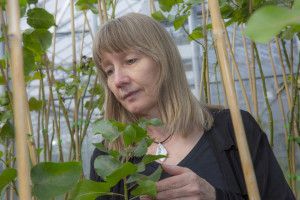
The research gives scientists clues about the genes that control plant structures and how we can manipulate them to our advantage.
Source: Paul Efland/UGA
Researchers at the University of Georgia (UGA) are looking to accelerate the biofuel industry with this new development in plant gene structure.
The UGA scientists have discovered that manipulating a certain gene in a hardwood tree makes easier the process of breaking wood into fuel, and simultaneously increases the pace of tree growth.
This from UGA:
In a paper published recently in Biotechnology for Biofuels, the researchers describe how decreasing the expression of a gene called GAUT12.1 leads to a reduction in xylan and pectin, two major components of plant cell walls that make them resistant to the enzymes and chemicals used to extract the fermentable sugars used to create biofuels.
With this study, researchers have gotten insight into the gene structure that controls the plant and have gained an understanding of how to manipulate it to our advantage.
“The difficulty of breaking down the complicated plant cell wall is a major obstacle to the cost-effective production of biofuels, and this discovery may pave the way for new techniques that make that process more economically viable,” said study co-author Debra Mohnen, a professor of biochemistry and molecular biology in the Franklin College of Arts and Sciences.
The biofuel industry could see a great gain from this development due to the potential for quick growth and ability to process large quantities of biomass – which makes biofuel more attractive for both growers and the industry.
Read the full paper here.
To learn more about the production of biofuels, we’ve got a great short course you’re going to want to check out. ECS member and prestigious researcher, Dr. Shelley D. Minteer, will be instructing a course entitled “Nanotechnology for Bioenergy: Biofuels to Fuel Cells” at the 227th ECS Meeting this May in Chicago. Register for this course online today!


